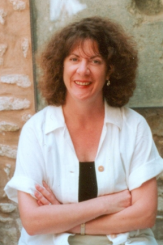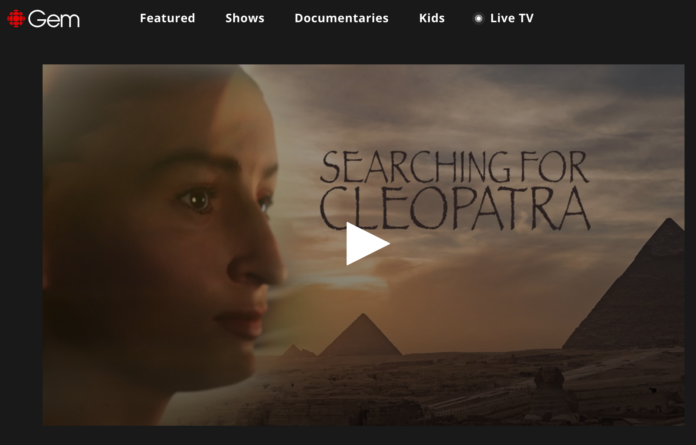If you are an anthropology student or taking a course in Classical Studies this semester, CBC’s latest documentary, Searching for Cleopatra on The Nature of Things should be of interest to you.
The Nature of Things, now in its 60th season, is a popular Canadian television series that features science and nature topics. It is narrated by David Suzuki, a Canadian academic, science broadcaster, and environmental activist.
-
In an interview with Imprint, Susan Teskey, director of Searching for Cleopatra, has revealed that the inspiration for the documentary came from an archeological dig as well as CBC’s skepticism that the version of history portraying Cleopatra as a sinister sexual temptress was the correct one.
-
“I think part of it is something a senior producer at the fifth estate used to say, ‘if everyone believes something to be true, it probably isn’t.’ It was kind of the show’s mantra,” Teskey said.
“The documentary is a mystery story – actually two of them. One is, who wa s the real woman behind the mythology. And the second is where is her tomb?” Teskey explained.
s the real woman behind the mythology. And the second is where is her tomb?” Teskey explained.
Teskey also revealed that the documentary has a couple of “Indiana Jones” moments with thrilling discoveries in the dig, and presents a lot of scientific technical advances in archaeology – for example, ground penetrating radar and x-rays.
Sheila Ager, UW’s Faculty of Arts Dean and a professor in the Department of Classical Studies, is featured prominently in CBC’s documentary as an expert on Cleopatra.
Ager confirmed that Cleopatra was a historically important figure.
“Octavian ruthlessly eliminated his rivals and mounted a massive propaganda campaign – and subsequently a military one – against Cleopatra and Antony… and the path was clear for the conversion of the Roman state from a Republic into an Empire. The conflict between Octavian on the one hand, and Cleopatra and Antony on the other, is one of the great ‘what if?’ moments in history. The fate of millions hung in the balance, and it’s no exaggeration to say that the course of subsequent western history might have been very different if Cleopatra and Antony had been the victors,” Ager explained.
Ager noted that the mystery surrounding Cleopatra makes it hard for us to tell what kind of person she really was.
“My own view, based on a lot of years of sifting through sparse and hostile sources, is that she was ambitious, courageous, intelligent, witty, innovative, and cared for her people… Another thing I’d like to emphasize, because it’s often ignored in the popular image of Cleopatra, is that she was a mother… Most people don’t realize that she had four children, one by Julius Caesar and three by Marc Antony,” Ager said.
Particularly noteworthy, according to Ager, is the fact that Cleopatra spoke Egyptian and was allegedly the first member of her dynasty in three centuries to bother to learn the language of the land that she ruled.
Cleopatra’s tomb was a structure that she had commissioned well before her death, and Ager described it as a substantial building, at least two stories in height, near the sea. “In all likelihood, that means it was in the royal quarter of Alexandria, much of which… is [now] underwater. It may still turn up as the underwater excavations continue,” Ager said.
Ager also noted that Cleopatra’s story reminded her of Hillary Clinton at the time of the 2016 Presidential campaign and election.
“The visceral anger that was whipped up against Clinton at the time by Trump and his supporters (“Lock her up!”) was stunning to me… [and the] vilification of her in 2016 was reminiscent of the demonic characterization of Cleopatra by Octavian’s propaganda team in the 30s BCE [sic] And… it’s so clear to me that Hillary Clinton’s sex, combined with her ambition to hold the highest political office, was an affront to millions who were terribly threatened by such a possibility. This is exactly the fear that Octavian was able to leverage against Cleopatra – the fact that she was a ruling head of state, and at the same time a woman, enabled him to demonize her as quite literally a freak of nature,” Ager said.
“If Cleopatra had lived today, you can bet that she would have been relentlessly cyber-bullied, trashed on Twitter, and mocked and vilified across the media, social and otherwise,” Ager added.
Kelly Olson, a professor in the departments of Classical Studies and Women’s Studies at the University of Western Ontario, teaches an entire course on Cleopatra. She agrees that our world does not appreciate powerful women at all. “The Romans were most certainly afraid of her and even today, not much has changed and powerful women are still scary to everybody,” Olson said.
As for a modern-day equal, Olson believes that Elizabeth Taylor was the “perfect actress” to play the part of the Queen of Egypt in the 1963 film classic Cleopatra.
“Taylor could be considered a modern-day equal to Cleopatra in a number of ways – both were powerful, intelligent women who had a lot of connections, were a force to be reckoned with, had multiple affairs and were also married several times.”
Ager believes that there may be a lesson for us to take away here. “So if I were to generalize a lesson… it would be a very basic one, but one that’s extremely important – don’t believe everything you read or hear, no matter how loudly, insistently, and violently it is declaimed.”
The documentary is available on demand and can be watched through CBC’s streaming service Gem.
https://gem.cbc.ca/media/the-nature-of-things/season-60/episode-5/38e815a-0139257d4f8
It is also available on The Nature of Things website.
https://www.cbc.ca/natureofthings/episodes/searching-for-cleopatra
Finally, the show is also available as an Apple podcast.
































